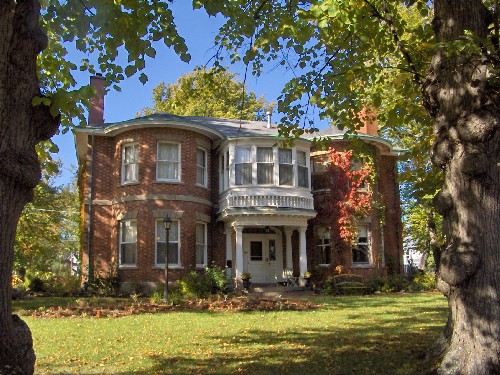Other Name(s)
Fairholm
Fairholm
Fairholm Inn and Carriage House
Fairholm National Historic Site of Canada
Fairholm
Links and documents
Construction Date(s)
1839/01/01
Listed on the Canadian Register:
2004/02/26
 Statement of Significance
Statement of Significance
Description of Historic Place
Fairholm is an early-19th century, brick villa with a former carriage house, located on a large, rectangular property in the city of Charlottetown. The formal recognition consists of the house, the carriage house, and the legal property on which they sat at the time of recognition.
Heritage Value
Fairholm was designated a national historic site in 1992 because it is a fine and rare surviving example of a Picturesque villa in Atlantic Canada.
Fairholm exemplifies the Picturesque villa as it was interpreted in Atlantic Canada, where the Picturesque aesthetic retained the stately classicism popular in the Maritime provinces. Built for politician and administrator T.H. Haviland Sr. (1795-1867), it is a rare example of early brick construction both on Prince Edward Island and within the Picturesque villa inventory. The spacious grounds reinforce the Picturesque qualities of the villa. A late-19th-century carriage house helps complete the villa landscape.
Sources: Historic Sites and Monuments Board of Canada, Minute, February 1992; Historic Sites and Monuments Board of Canada, Plaque Text, 1993
Character-Defining Elements
The key elements that relate to the heritage value of this site include:
- features which express the Picturesque aesthetic, including: the smoothly curving bowed windows running the full height of the facade; the deep eaves; and the extensive grounds surrounding the house
- its classical form, consisting of a two-storey block, capped by a gently pitched hip roof framed by four end chimneys
- its classical symmetry and details, evident in: the symmetry of the main façade; the central door surrounded by sidelights and a graceful elliptical fanlight; and the even disposition of openings
- its materials, including: mottled red brick walls; and cut stone used as lintels over the windows, for the raised basement, and as a string course between the two storeys
- its classical centre-hall plan, with double drawing room and study on one side; dining room, butler's pantry and kitchen on the other; bedrooms arranged around a central hall on the second storey, and servants' rooms on the third floor, accessed by narrow back stairs
- Neoclassical detailing in its interior spaces, including: ceiling rosettes, wide cornices, and broad, simple mouldings as baseboards and door and window surrounds in the principal rooms; mantelpieces; round-arched window and door openings with cornices and keystones in the upper hall and stairs; and curved, bow windows
- its spacious lot
- the siting, design and proportions of the late-19th-century coach house
 Recognition
Recognition
Jurisdiction
Federal
Recognition Authority
Government of Canada
Recognition Statute
Historic Sites and Monuments Act
Recognition Type
National Historic Site of Canada
Recognition Date
1992/06/07
 Historical Information
Historical Information
Significant Date(s)
n/a
Theme - Category and Type
- Expressing Intellectual and Cultural Life
- Architecture and Design
Function - Category and Type
Current
- Residence
- Estate
Historic
- Residence
- Single Dwelling
Architect / Designer
n/a
Builder
n/a
 Additional Information
Additional Information
Location of Supporting Documentation
National Historic Sites Directorate, Documentation Centre, 5th Floor, Room 89, 25 Eddy Street, Gatineau, Quebec
Cross-Reference to Collection
Fed/Prov/Terr Identifier
577
Status
Published
Related Places

230 Prince Street / Fairholm
Fairholm is a rare Atlantic Canadian example of the architectural style influenced by the Picturesque movement. This villa, which exhibits Classical elements, is located on a…